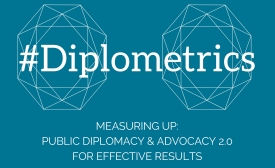digital diplomacy

Ilan Manor compares how different MFAs have incorporated digital diplomacy.

A CPD paper reflects on and refines current practices in digital advocacy campaigns.
Aliya Harir was born in 1991 in Karachi, and grew up hating India. As a child, she’d often worry about India attacking Pakistan and ask her father where he’d take her in case an attack happened. But today, she is one of the founding members of the Catalyst, a non-governmental organization (NGO) working for peace. It is a part of the Aaghaz-e-Dosti (start of friendship) initiative, in association with Mission Bhartiyam group of India, to enhance people-to-people relations between India and Pakistan.
Documents from Mossack Fonseca, [...] reveal offshore companies linked to Deng Jiagui, who is married to Chinese President Xi Jinping’s older sister, as well as Li Xiaolin, the daughter of Li Peng, the former premier. […] that’s not stopping officials around the world from addressing the issue of perception. One way to do that is ordering a media blackout [...]

Global Affairs Canada and CPD jointly hosted a program in Ottawa on PD and advocacy evaluation by foreign ministries and international organizations.
It is bringing together some 50 diplomats and scholars from 25 countries to look at how states are using digital platforms as a diplomatic tool. The conference is dealing with a number of issues that are arising as a result of the use of social media by foreign ministries around the world, including the need to train diplomats in social media engagement, ways to evaluate the impact, and the intersect between digital diplomacy, public diplomacy, and nation branding.
According to Matthew Barzun, U.S. ambassador to the United Kingdom, diplomats in the digital age have a lot to learn from the story of Encarta, Microsoft’s ill-fated digital encyclopedia. […] Instead, he suggested, managing relationships between countries in the 21st century will be most successful when it focuses on “analog diplomacy in a networked world”—what Mr. Barzun jokingly called “Wikiplomacy.”

Read about the latest trends and topics in Turkish soft power in this new e-publication.







